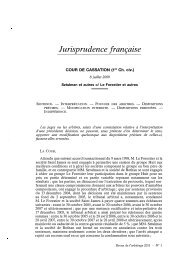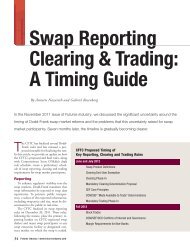What is a Broker-Dealer? - Davis Polk & Wardwell
What is a Broker-Dealer? - Davis Polk & Wardwell
What is a Broker-Dealer? - Davis Polk & Wardwell
Create successful ePaper yourself
Turn your PDF publications into a flip-book with our unique Google optimized e-Paper software.
§ 1A:4.3 BROKER-DEALER REGULATION<br />
(vii) a note evidencing loans by commercial banks for current<br />
operations. 275<br />
In determining whether a note bears a strong resemblance to the<br />
items on the l<strong>is</strong>t or whether another category of instrument should be<br />
added to the l<strong>is</strong>t, courts consider four factors:<br />
(i) motivation of seller and buyer;<br />
(ii) plan of d<strong>is</strong>tribution of the instrument;<br />
(iii) reasonable expectations of the investing public; and<br />
(iv) presence of alternative regulatory regime. 276<br />
It should be noted that section 3(a)(10) of the Exchange Act<br />
expressly excludes from the definition of “note” “any note . . . which<br />
has a maturity at the time of <strong>is</strong>suance of not exceeding nine<br />
months.” 277 However, the SEC has taken the view that the only<br />
instruments that qualify for th<strong>is</strong> exclusion are those that fall under<br />
section 3(a)(3) of the Securities Act which requires that the note ar<strong>is</strong>e<br />
out of a current transaction or the proceeds of which have been or are<br />
to be used for current transactions. 278<br />
Bank certificates of deposit (CDs), which have been analyzed as a<br />
type of “note,” have been the subject of considerable litigation both<br />
before and after Reves. The presence or absence or r<strong>is</strong>k reducing<br />
factors, such as banking regulations and insurance, has typically<br />
played a key role in the determination of whether a CD <strong>is</strong> a security.<br />
In Marine Bank v. Weaver, the Supreme Court held that a federally<br />
insured CD was not a security subject to regulation under the<br />
Exchange Act. 279 Although the CD in Marine Bank had similarities<br />
to other types of long-term debt instruments that are usually treated as<br />
securities, the Supreme Court found it important that the CD was<br />
<strong>is</strong>sued by a federally regulated bank, which provided the purchaser of<br />
the CD protection under federal banking laws and made payment in<br />
full to the purchaser of the CD almost guaranteed. Thus, the Court<br />
held that th<strong>is</strong> r<strong>is</strong>k reducing factor made it unnecessary to subject these<br />
instruments to regulation under the Exchange Act. 280 However, the<br />
Court stated that CDs could be securities subject to the Act in other<br />
275. Id.; Exchange Nat. Bank of Chicago v. Touche Ross & Co., 544 F.2d 1126,<br />
(2d Cir. 1976), and Chem. Bank v. Arthur Andersen & Co., 726 F.2d 930<br />
(2d Cir. 1984), cert. denied, 469 U.S. 884 (1984).<br />
276. For a more detailed d<strong>is</strong>cussion of each factor, see Reves, 494 U.S. at 66.<br />
277. Exchange Act § 3(a)(10).<br />
278. See SEC Release No. 33-4412 (Sept. 20, 1961).<br />
279. Marine Bank v. Weaver, 455 U.S. 551 (1982).<br />
280. See id.<br />
1A–62





